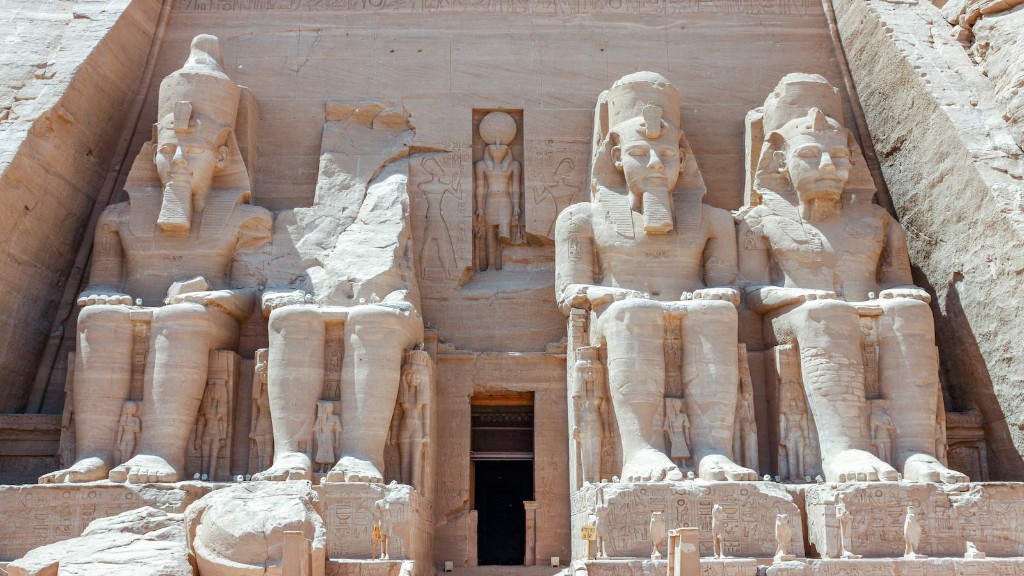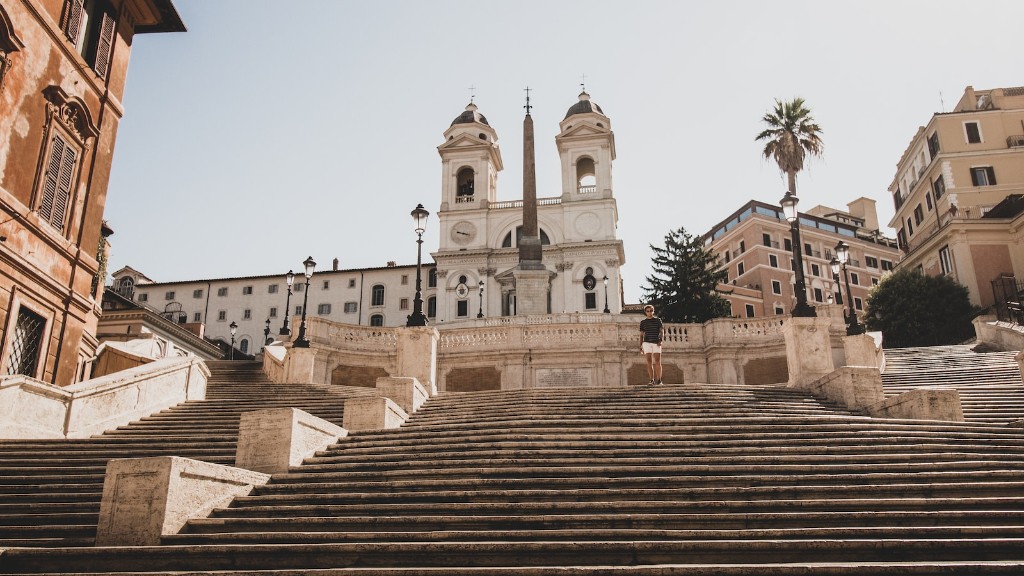Origins of Pharaohs
Pharaohs, the rulers of Ancient Egypt, have been elevated to legendary status in many societies. Ancient Egyptians believed the pharaoh to be a god-king, possessing supernatural powers. Pharaohs were regarded as the living link between the gods and their people, their place in Egyptian society firmly established and unquestioned. To the ancient Egyptians, the pharaohs were more than just kings and queens, they were gods on Earth.
The power of a pharaoh was absolute. The pharaoh was a source of wisdom and guidance, and his word was law. Although some pharaohs, such as those from the 18th Dynasty, were more powerful than others, all pharaohs had ultimate authority. According to Egyptian mythology, the pharaohs were selected by the gods to lead the people. Unlike other civilizations, the pharaohs were regarded as divine by their subjects.
It is not known exactly when pharaohs first came to power in Ancient Egypt or how the Egyptian monarchy became an absolute monarchy. According to Egyptologists, the early Egyptian kings of the Predynastic Period (c. 3100 – c. 2686 BCE) may have been elected by common assent but then became God-Kings by the time of the Early Dynastic Period (c. 2686 – c. 2181 BCE). The pharaohs’ strong connection with the gods made them the ultimate rulers of the land. This connection was made stronger over time, as the pharaohs began claiming that their right to rule was determined by the gods themselves.
The Pharaohs’ power and influence over the people of Egypt was also bolstered by a complex and elaborate administrative system. Pharaohs appointed governors, chief priests, scribes, and other high-ranking officials to govern in their absence. The pharaohs’ ability to appoint and remove officials as they saw fit further improved their control over the population.
Although the pharaohs had absolute authority over the people of Ancient Egypt, their power was not unchecked. The Pharaohs were expected to abide by certain religious and cultural laws and responsibilities. They were expected to build monuments to honor the gods, make the land prosperous, defend the kingdom, and ensure their subjects were treated fairly. These expectations provided a code of conduct for the Pharaohs to adhere to in order for them to remain in power.
Strength of Pharaohs
The power and influence of the pharaohs was further supported by a strong military force. Pharaohs had a standing army of chariot riders and infantry, as well as a naval fleet. Through these forces, Pharaohs were able to expand and protect their territories. Additionally, Pharaohs employed highly trained specialist forces, such as the elite Medjay archers, to protect their person and palace.
Despite the presence of a strong military forces, the pharaohs did not rely solely on their troops to maintain their rule over the people. The power of the pharaohs was largely due to their extraordinary ability to garner the support and loyalty of their people, earned through granting special privileges and bountiful offerings. Pharaohs were renowned for their construction of grand temples, palaces, and monuments, which were seen as symbols of their divine power.
The Pharaohs of Ancient Egypt maintained control over their people not only by granting them material wealth, but through superstition and fear. Pharaohs were believed to be closely connected to the gods and were, therefore, able to use religion to manipulate their subjects. Pharaohs ordered the construction of temples and sponsored religious festivals in honor of the gods. By instilling fear of the gods in their people, Pharaohs were able to secure their loyalty and, in turn, their power.
The Pharaohs of Ancient Egypt were viewed as semi-divine by their people and held absolute power over them. Pharaohs were able to maintain their power through a host of methods, including military might, religious control, and material generosity. Pharaohs were a unique phenomenon, singularly more powerful than the rulers of any other civilization at the time.
Rise of Pharaohs
For centuries, the Pharaohs of Ancient Egypt rose to the throne, reigning with absolute authority. The first Pharaoh of Ancient Egypt was believed to be Narmer or Menes, who unifiedupper and Lower Egypt in c. 3100 BCE. Subsequent Pharaohs were selected either from the ruling family, by the gods, or by the people of the nation. The reigning Pharaoh would often appoint a designated heir, chosen from within their family, to succeed them.
Pharaohs typically inherited the throne during childhood and would often appoint a regent to oversee the day to day governing of the kingdom. Until the Pharaoh came of age, the regent took up the role as ruler and would often conspire to maintain their power by preventing the Pharaoh from reaching adulthood. Regents were often highly unpopular with the people, who viewed them as usurpers of legitimate power. Consequently, some regents were overthrown by the people or by ambitious relatives.
Pharaohs often bore multiple official titles. Chief among them was Horus, the god of kingship, who granted Pharaohs divine authority and the priest title of “High Priest of Every Temple”. Across various periods and dynasties, Pharaohs adopted a number of other titles, such as “King of Upper and Lower Egypt,” “Lord of the Two Lands,” and “Beloved of Aten”.
Pharaohs ordained a number of laws in Ancient Egypt that would remain in effect for millennia. Reforms such as the establishment of a common currency, taxation system, and legal code ensured that the people were governed with a fair and consistent hand. Pharaohs also issued edicts for the preservation of temples, monuments, and tombs, which would become some of the most enduring works of art in Ancient Egypt.
Despite their absolute power, the Pharaohs of Ancient Egypt were not invincible. Over the centuries, there have been instances where Pharaohs were overthrown by foreign invaders, or by ambitious individuals or families who sought to usurp power. Nevertheless, the Pharaohs of Ancient Egypt remain one of the most powerful and iconic figures in the ancient world.
Pharaohs and the Gods
The Pharaohs of Ancient Egypt worshipped their gods with fervor and established a strong bond between themselves and their deities. Pharaohs built numerous temples in honor of the gods, often appoint gods to be their personal protectors, and made regular offerings to the gods. Pharaohs were expected to uphold the dictates of the gods and punished those who failed to do so.
Egyptian mythology held that the Pharaohs were sent by the gods to lead mankind. As Pharaohs were believed to be gods on Earth, they were expected to honor and protect the gods by worshipping them and making sure that their subjects followed their divine laws. This religious obligation placed additional burdens and restrictions on the Pharaohs, as they were expected to serve as an example to the people of how to properly venerate their gods.
Pharaohs also viewed themselves as gods and made sure to flaunt their status. Pharaohs often wore extravagant jewelry, elaborate clothing, and headdresses associated with their divine roles. Pharaohs also carried scepters and held feasts, declaring their god-like status and generosity to their people. Pharaohs were also known for making grand entrances during religious festivals, further illustrating their power and divinity.
An Ancient Egyptian king was expected to maintain a strong connection with the gods and to serve as an example for their people. Pharaohs wielded their divine power with great strength and precision, ensuring that their rule would be remembered for generations to come.
Pharaohs and the Afterlife
Beliefs in the Afterlife were incredibly important to Ancient Egyptians and Pharaohs sought to ensure their place in it. Historically, Pharaohs granted divine status to their mortal remains by having their bodies mummified and buried with immense wealth and riches. Pharaohs also had their tombs guarded by priests and buried with enough food and drink to sustain them in the afterlife.
Pharaohs were said to become gods in the afterlife, and as such, they had to make sure that they had the protection of their gods in both the mortal world and the afterlife. Pharaohs often had multiple tombs built for them, to protect their remains from grave robbers. Pharaohs also kept records of their deeds in their tombs, to show the gods their accomplishments and prove that they were fit for divine status.
Pharaohs believed that after their deaths, their spirits could travel between the gods and their people. Pharaohs often featured prominently in popular tales and legends, as the powerful gods who walked among the people. Pharaohs also believed that they would be reunited with their deceased family and friends in the afterlife, living happily for eternity.
The Pharaohs of Ancient Egypt were powerful rulers who believed that their divine status would continue into the afterlife. They constructed grand tombs and sarcophagi, filled with riches and wealth, which were meant to keep their remains safe and secure and ensure their place in the afterlife.
Pharaohs and their Subjects
The Pharaohs of Ancient Egypt were seen as a source of wisdom and enthusiasm but also one of fear and intimidation. The people of Ancient Egypt were steeped in superstition and regarded the Pharaohs as the ultimate source of power, both because they were believed to be gods on Earth and because of the Pharaohs’ absolute control over the people.
The Pharaohs of Ancient Egypt expected absolute loyalty from their subjects, demanding that the people obey their commands and carry out their orders without hesitation. To ensure their loyalty, Pharaohs often granted favors and privileges to their most devoted supporters, while punishing those who showed disrespect. Pharaohs also had the power to banish people and confiscate land and possessions, further illustrating their power and control.
The Pharaohs of Ancient Egypt were also immensely generous with their people. Pharaohs would often sponsor festivals and celebrations, build temples and monuments, and hand out food and other items to the needy. These generous acts increased the Pharaohs’ popularity and secured their place in the hearts of their subjects.
In short, the Pharaohs of Ancient Egypt were powerful rulers who maintained control over their people through fear and favor. Pharaohs were feared for their absolute power and revered for their generosity and divine status. The Pharaohs of Ancient Egypt remain some of the most influential figures in the history of the world.



